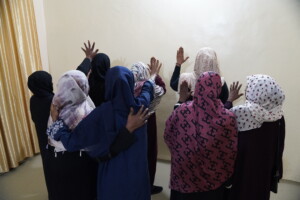Sudan crises: Students detained, police transport passengers
A number of school students who demonstrated against the rise of prices and the economic crisis in Blue Nile state has been detained. In Khartoum, police were deployed to provide public transport.
 People queue along the road in Khartoum (RD)
People queue along the road in Khartoum (RD)
A number of school students who demonstrated against the rise of prices and the economic crisis in Blue Nile state has been detained. In Khartoum, police were deployed to provide public transport.
On Thursday morning, secondary school students demonstrated in Ed Damazin in Blue Nile state against the economic crises and the risen costs of living.
The students shouted slogans to condemn the government’s policies during the demonstrations. Security forces, however, managed to break up the demonstrations using tear gas and sticks.
They detained a number of young demonstrators, including Mohamed Abdelrahim (17), Abdelaziz Mahmoud (17), Abdelfattah Ismail (17), Mohamed Abbas (18) and Saleh Abdallah (18).
Last week, children in Sennar went out to protest in the streets after several schools closed their doors because of the lack of bread.
Security buses for transport
The capital Khartoum and the surrounding states have witnessed a new increase in the prices of food and consumer goods, in light of Sudan’s ongoing liquidity crisis.
On Thursday, police and security personnel were deployed to the main transport stations in Khartoum, Karkar in particular. They had to organise the peoples’ rides on the buses and vehicles provided by the security apparatus and police.
Sudan’s Ministry of Oil and Gas announced in a statement the appointment of supply and distribution observers of their own staff; they will follow-up the work and monitoring of the stations that is currently undertaken by the police and security service.
Earlier in December, residents in Khartoum complained that the city has become the ‘capital of queues’ of vehicles waiting to obtain fuel at the pump stations. The shortage of fuel that has hit Sudanese cities in the past months has led to a transportation crisis that exacerbates the shortage of fuel and consumer goods, but also heavily impacts millers and bakers.
Sudan is suffering from chronic hard currency shortages and a soaring inflation since 2012. Prices skyrocketed in particular after the government implemented a set of austerity measures in January this year. The crises have led to recurrent shortages in commodities like bread and fuel.











 and then
and then